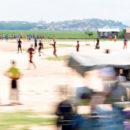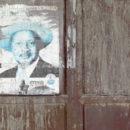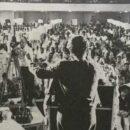Sierra Leone: How the SLPP took power. And then took some more.

Last year, the Sierra Leone People’s Party won the presidency but not parliament. Power was divided, but not for long.

Ballots being cast in Sierra Leone’s 2018 elections. Credit: Carol Sahley / USAID
In Sierra Leone today, the ruling Sierra Leone People’s Party (SLPP) dominates the political landscape. It controls the presidency, under Julius Maada Bio, and has a slim majority in parliament. Its ability to shape the nation’s politics is secure.
Just over a year and a half ago, however, things looked very different. Following Sierra Leone’s March 2018 elections, power was divided. In the presidential ballot, Maada Bio narrowly defeated the candidate from the incumbent All People’s Congress (APC), leading to the country’s second democratic handover since the end of civil war in 2002. But in the parliamentary vote, the APC managed to keep its majority, winning 68 seats to the SLPP’s 49.
It has taken concerted efforts since then for the SLPP to wrest control of parliament from the APC. It now holds 59 seats to the main opposition’s 57 in the 146-member house (which includes 14 indirectly-elected chiefs).
How did the ruling party manage this? Why has it gone to such lengths to gain control of a body that was not seen as particularly relevant under the last administration? And why now?
Taking back control?
The SLPP’s struggle for control started straight after the elections. Ahead of the first session of parliament in April 2018, the high court served injunctions to 16 newly-elected APC MPs barring them from participating. The court claimed the members had illegally received government salaries during the election campaign.
The charged MPs defied the order, but were forcibly removed from parliament. The rest of their opposition colleagues followed them in solidarity. This presented the ruling party with its first chance to take control of proceedings by appointing Abass Chernoh Bundu, a member of the SLPP, as Speaker of the House.
In May, the high court upheld the injunctions for ten APC MPs. Nine were immediately replaced by their SLPP opponents, while one seat was to be decided through a by-election.
Supporters of the decision argued that the precedent for such a move was set in 2012 when an SLPP candidate’s victory was nullified and the APC runner-up was made the winner. Opponents saw the court’s action as being politically-motivated and pointed out how it perfectly wiped out the APC’s majority in one fell swoop. Protesters in the capital Freetown took to the streets where they were met by a heavy-handed police response.
The SLPP now had an effective majority in parliament given that the 14 non-partisan chiefs typically vote with the government. Nonetheless, it remained intent on winning the Hamilton by-election to replace the final indicted MP.
On voting day in August 2019, the APC initially looked on course to reclaim the seat amid low turnout. However, the process was disrupted when a group of young men invaded a polling centre and scattered ballot boxes containing almost 3,000 votes. In response, the Chairman of the National Electoral Commission (NEC), N’fah Alie Conteh, cancelled the election.
As videos of the incident made the rounds on social media, opposition parties made strong public accusations. Olufemi Claudius-Cole of the Unity Party condemned what he claimed were “SLPP thugs in convoy”. MP Kandeh Yumkella, leader of the opposition National Grand Coalition (NGC), denounced the decision to terminate the vote as “daylight robbery”.
A new date for the re-run has still not been set and the seat remains vacant.
By-election battlegrounds
In the 18 months since the general election, Sierra Leone has held other by-elections that have been marred by political violence and accusations of malpractice.
In September 2018, a by-election was organised to replace a deceased councillor in Kambia District’s Tonko Limba Chiefdom, a longstanding APC stronghold. In the run-up to this seemingly minor election, senior party officials and supporters descended on the area. NEC staff reportedly found themselves “under siege” before the military intervened in clashes that led to the shooting of a teenage boy.
Following that unrest, the vote was postponed until March 2019 when the SLPP emerged victorious despite 84% of the ward voting for the APC just the year before. Opponents cried foul, criticising the NEC’s refusal to tally the vote in front of observers and pointing to the fact that a Polling Centre Manager had reportedly been identified as an “SLPP Party operative”.
More recent by-elections, held in Falaba and Koinadugu districts last month, were less acrimonious but no less crucial to shaping the balance of power in parliament. Whilst the APC held on to the seat in the latter constituency, the SLPP candidate won in Falaba with 56.7% to take another seat from the APC, extending its parliamentary majority to two.
As Marcella Samba-Sesay from the Campaign for Good Governance puts it, by-elections in Sierra Leone have become battlegrounds for “a [wider] fight between the APC and SLPP that permeates every space in society, including state institutions”.
But why bother?
On coming to power, President Maada Bio and the ruling SLPP immediately engaged in concerted efforts to overturn their 19-seat deficit in parliament. They were successful, but their determination on this front has surprised some given the limited influence the parliament has typically had over the country’s policy direction.
There may be various reasons for its strategy. To begin with, an opposition Speaker of the House would have made it far harder for the SLPP to push through initiatives such as the Commission of Inquiry into the administration of former President Ernest Bai Koroma. Some analysts also suggest that Maada Bio has been reluctant to buy the support of smaller parties and independents, who hold 15 seats, to pass legislation. By side-stepping the need to do this, the president has, among other things, squeezed them out of the political picture leading to a drop in their support.
At the same time, winning by-elections looks good for the SLPP in demonstrating support for its “new direction”. This perhaps explains its willingness to win by whatever means necessary. Such victories allow the ruling party to suggest its approach is gaining popular support while reducing the influence of the opposition. Establishing a pattern of SLPP victories could also make similar results in future elections appear more credible even if they are disputed.
Following the 2018 elections, it briefly looked as if political power in Sierra Leone would be shared. The APC soon lost its parliamentary majority, but this is not all that was lost, according the Samba-Sesay.
“The multiplicity of parties and the hung parliament should have been a watershed in our democracy, but unfortunately this was systematically killed before it started,” she says. “Moving forward we need to cultivate a notion that opposition is an integral part of democracy”.






